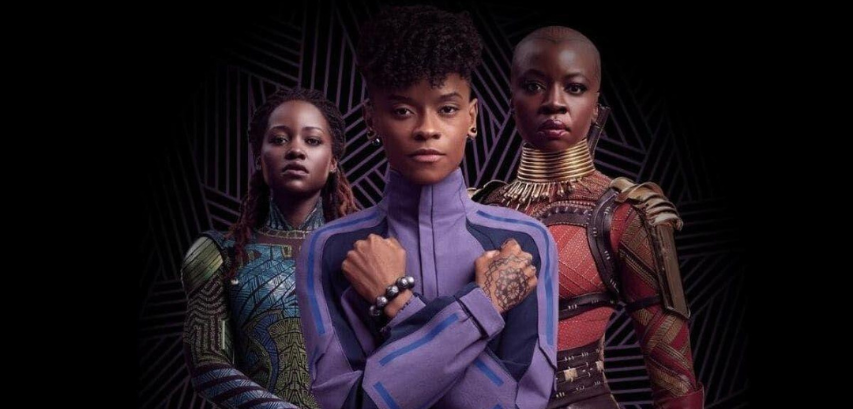If you’re anything like me, you flock to the movie theater every time a new Marvel movie hits the box office. Naturally, I flew to the movie theater when Black Panther was released in 2018. Being able to see Black people wearing traditional Kente clothing and African wear, embodying the spirit of Wakanda, and being unapologetically Black was both exhilarating and liberating. Seeing black children being able to finally see a superhero that looks like them brought me joy. The film also demonstrated the potential, bravery, and tenacity of Black women, such as Princess Shuri, which ignited my “Black girl nerd.” Seeing a film that depicted Black excellence was refreshing in a world where so much of our experience is told through the lens of oppression and death.
From the moment I saw Chadwick Boseman on the screen, I was impressed with how infallible and personable he was. From his influential and trailblazing performances, he evidently was on his way to being a cutting-edge actor. He possessed an exhilarating confidence about him. He conveyed a sense of humbleness that had never been seen in other actors. Both on and off the silver screen, he was Black Excellence anthropomorphized.
I was compelled to see the sequel, Black Panther: Wakanda Forever, since it was no longer simply a marvel film but also had personal importance for me. Although I knew there was no way that the newest film could top the original first one, I was still confident that Marvel knew what they were doing. However, at the back of my mind, I was insecure. Despite this, the film took my breath away. Ryan Coogler took what is such a complex and intricate matter and turned it into something fallible. He took the portrayal of losing someone highly regarded and highly adored and showed how it could thoroughly shake and feather a community and its people. Black death and grief are unnerving, disturbing, and shattering experiences, but Coogler emphasized its impact on our foundation and how we deal with it.
Letitia Wright’s Shuri journeys toward acceptance and farewell on a rocky, precarious path. The lab that Shuri is found in for most of the movie serves as her coping mechanism to cope with the loss of her brother and helps prevent her from alternating between grief and guilt. A person’s identity is irrevocably altered by grief. Having lost ‘the last person who knew her well’ tears Shuri from within. Rather than being noble like her brother, she pursues a path of bloodlust in her quest for revenge and bitterness. She tears up quietly when she recalls the moments she had with T’Challa at the end of the film. As the film points out, healing is an abominably messy process, and there might never be total closure, but there can be a broken and resigned acceptance, the stage of grief few really acknowledge.
To me, Shuri’s emotional reactions to grief were real and powerful – the scenes in which she resisted tears, the scenes in which she broke down and cried profusely, and the scenes in which she wanted to burn the world. It has happened to all of us. Even though the diversity of Black women’s grieving brought me comfort and solace, watching a Black woman in rage and hearing people understand her anger and need to seek justice were equally satisfying revenge. The uncontested, understandable, and unmeasurable display of rage in Shuri could be felt through the screen.
Nakia, being T’Challa’s love interest, expressed countless times throughout the movie that she needed time and space to process the grief that she was facing. This mirrored the act of abandonment surrounding grief. Nakia felt as though she had to sacrifice a life she once knew for solace and isolation to deal with what had happened. She was willing to sacrifice her connection to Wakanda, the throne, and its people in order to give herself space to grieve such a critical loss. To show this idea of isolation is monumental as it highlights what many Black matriarchs have to do when death happens, “abandon” their loved ones. Nakia painted the importance of voicing and implementing boundaries during the grieving process.
The massive success of Black Panther stemmed from its substantial political, cultural, and emotional identity, built by a team rocked by the death of its noble heart. At the center, Wakanda Forever is a remarkable achievement that satisfies spectators who are curious about whether the Black Panther will become an MCU hero and who also want to take part in a collective celebration of a cherished actor and his ground-breaking performance. The franchise moves forward with an unbreakable need to defend its loved ones and uphold the traditions of its predecessors, much as Black and Indigenous communities have done throughout their complex histories. The way the women in the movie stood proudly in their own faults, shortcomings, and discomfort while dealing with the weight of bereavement and Black womanhood enabled me to do the same. The women who will defend Wakanda in the face of a brand-new, unsettling, but always hopeful future are at the center of all these initiatives.
Wakanda Forever!

